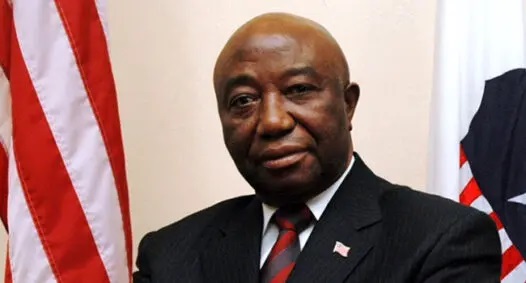By Kemo Cham
At his inauguration speech, new Liberian President Joseph Boakai mentioned something about his country’s democratic path. But his speech was cut short after what officials described as a strong heat wave that overwhelmed the veteran politician.
Yet the ceremony, as well as the incident itself, were significant for Liberia: This was the second time the country was experiencing a peaceful transfer of power since 2006. It also epitomised the country’s incomplete story, one which had been previously cut down by war.
In attendance at the ceremony at the Capitol Building, the seat of the legislature in Monrovia, were two of his predecessors, Ellen Johnson Sirleaf — the woman he served under as vice-president from 2006 to 2018 — and George Weah, who succeeded her.
“It is a celebration of the new democratic dispensation in our country,” Mr Boakai said, adding: “It is a rare occurrence and a departure from our recent past.”
That past was characterised by a brutal civil war that lasted for about 14 years, which was fueled by corruption, maladministration, nepotism and deep-rooted poverty.
The Sirleaf administration was accused of doing less to address these vices. To many of her critics, including at the time Weah’s Congress for Democratic Change (CDC), they got worse under her watch.
That was partly the reason for the Unity Party (UP), with Pesident Boakai as its flagbearer, lost the 2017 presidential election to Weah. Mr Weah wasn’t as lucky as Ms Sirleaf, as Liberians couldn’t allow him a second chance after failing to meet their expectations during his first term.
Not only did corruption worsen under the watch of the football legend, according to dropping rankings by Transparency International, he was also accused of encouraging it both by some of his actions and inaction.
Public expects more action
President Boakai’s speech was 6,000 words long. Yet the public may expect more of his walking, the heatwave notwithstanding, than talking.
His campaign platform, dubbed the ‘Rescue Mission’, was built on the premise of salvaging the sinking ship that was captained by Weah.
“We see hard times, we see dysfunction, we see culture of impunity, we see corruption in high and low places. It is these and similar conditions that we have come to rescue. But we come with false assurance to no one,” he said on Monday.
“Our plan to fix the ills we are inheriting must go together with realistic expectations,” he added. How he performs in the next six years will be determined by the decisions he takes within the next few months, starting with his appointments to key positions.
With his first major appointments within hours of his inauguration, the new Liberian leader appears to have set the tone for his administration’s priorities. Among five key appointees are the head of the police, national security adviser, finance minister and the Central Bank Governor.
Challenge
There could be a challenge: Liberia has a small pool of talent, and his Cabinet may yet be drawn from people who served, and got criticised, under the Sirleaf administration, signaling fears of ‘business as usual’.
Liberia still faces post-war justice demands including hundreds of women who carry scars of sexual violence during the brutal episode.
President Boakai announced at his inauguration that plans were already in motion to institute a War and Economic Crimes Court.
It could be tricky because President Boakai also has political ties to one of the notorious former warlords in the country: Prince Johnson.
Infamous for toasting for violence in the civil war, Johnson mastered the art of surviving relevant in Liberian politics including being elected senator. Yet he is sanctioned by the US.
He first came to fame as an ally of the imprisoned former President Charles Taylor during the war. He would break away from Taylor’s National Patriotic Front of Liberia (NPFL) rebel group to form the Movement for Democracy and Development (MODEL).
With his political party, the Movement for Democracy and Reconstruction, he transformed himself into some sort of a powerful kingmaker in the last two decades.
His stronghold in the Nimba County constitutes a huge voting bloc.
It seems Johnson knows how to predict the outcome of all four elections that have been held in the country since after the war, so that he has carefully maneuvered to remain on the side of the winner every time.
He supported Sirleaf in both the 2005 and 2011 elections.
In 2017, when he himself ran for the presidency, he switched gears towards Weah after the vote went into a second round.
And in the last election, his party formed an alliance with UP, which landed them the Vice Presidency, which is occupied by his nominee and right-hand man, Jeremiah Koung.
If all of the previous alliances were meant to provide him protection against prosecution, they did work.
‘Need for closure’
In Boakai’s speech on Monday, he surprised many when he spoke about the need to bring closure to the families of the estimated quarter of a million people who died during the war.
“We cannot forever remain unmoved by this searing national tragedy without closure,” he said, disclosing that he had set up an office “to explore the feasibility for the establishment” of the court to provide an opportunity for those who bear the greatest responsibility for war crimes and crimes against humanity to account for their actions in court.
Boakai also said that his government will seek advice and assistance from the Office of the United Nations Secretary-General to ensure that the court, if found feasible, will be in compliance with the highest standards of similar courts everywhere.
The Liberian legislature, he added, will also “have its say appropriately in this matter in order to avoid any appearance of vendetta or witch-hunt.”
Johnson has always viewed calls for the creation of a war crimes court as a witch-hunt targeted at him alone. He has fought all previous attempts vigorously both in and outside of parliament.
The most memorable showdown between him and ardent Boakai supporter, Senator Abraham Darius Dillon of Montserrado County, took place in 2021, when they exchanged heated debate that even bordered around threats from the war lord turned preacher.
Senator Dillon notably said that if Liberia sincerely wanted to bring to check public officials who mismanaged public funds, it must establish a war and economic crimes court to put measures in place against their recurrence.
While he never attempts to deny the occurrence of war crimes, Johnson has always argued that the actions of his group were justified by the suffering the people of his region were subjected to.
“What happened during the civil war was a revenge for our people who were killed in Nimba. Nimba county was declared enemy of the state; what did you expect us to do?” he said.
When the clashed happened in 2021, Johnson had the protection of the Weah Administration. This time round, they are both on the side of Boakai.
It will be interesting to see what happens when the issue goes to the legislature. Source: www.theeastafrican.co.ke








